I try to write my posts as unbiased as possible and recommend the products I consider to be useful and the best. I use affiliate links, this means that–at no extra cost to you–I can make a commission on a purchase you make after clicking on them. As an Amazon Associate I earn from qualifying purchases.
Interview with Reactive Dog Expert
Ali Brown
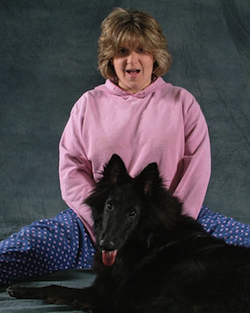
In this interview with reactive dog expert Ali Brown, learn about dog aggression training and restore your friendship with your hound.
Ali Brown started her career as a behavior therapist/consultant with mentally challenged children and adults. She studied psychology and has a M.Ed. Later on she switched her focus to canines, was one of the first to be certified as a CPDT and is also a Certified Dog Behavior Consultant.
One of the things I admire about Ali is her drive to keep on learning new techniques through seminars, books and experience. She also spreads her knowledge traveling all over the US teaching her popular Reactive Dog Seminar and has written 2 books to help owners of fearful and aggressive hounds.
If you ever hear someone tell you that being forceful is the only way to deal with reactive dogs, read along. Ali, with over 10 year of training experience and having helped hundreds of people will tell you that kindness, understanding and lots of training through classical and operant conditioning are the most effective ways to treat aggressive and fearful canines.
We asked Ali to answer a few questions about dog training for us, and we think you'll find her answers helpful and interesting. Enjoy!
1. You started specializing in reactive dogs after adopting Acacia into your family and realizing she had reactive issues. What are the top 3 training tips you learned when your first started this path, that you still use today with your dogs and in your classes?
The tips I learned (through tons of reading and other materials):
- Manage carefully. Have eyes in the back of your head. Know where everything and everyone is at all times. Protect your dog from stimulus overload.
- Teach a fantastic name recognition.
- Use classical and operant conditioning to teach the dog to trust you, trust the process, and learn new skills that allow the dog to make better choices.
2. What do you tell owners of reactive and fearful dogs to stay motivated with their training throughout difficult times?
I usually give personal experiences. Often, students share frustration that they can’t control other dogs being near their dog or coming at their dog. They want to know how they are supposed to help their dog under these circumstances.
I share the story about when I was walking Acacia in a large field at a university and a lab came bounding toward us, the owner yelling ‘he’s friendly’ and me yelling back ‘she’s not’. The dog, a black lab (Acacia’s worst trigger), ran up and jumped happily on her head. She made a huge scene (all noise, no damage...true to reactivity) and the dog ran off, yelping. At that moment, she looked at me, shaking and wagging, clearly stressed about the event and desperate for reassurance. All I could do was smile at her, tell her it was ok, that we did the best we could, and reward her for focus all the way back to the car. That was a pivotal moment for her, and for me. After that, she really did trust me. We can’t prevent situations like this from happening, but we can help the dog to understand that we are not perfect, and we are in this together.
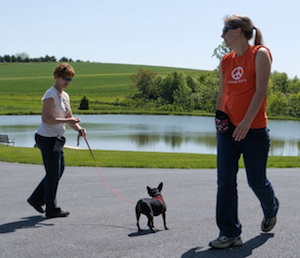 During one of Ali Brown's Reactive dog classes. Her training classes are always held in big fields, giving hounds lots of room to avoid feeling crowded. Above a dog focusing on her owner instead of going for the passersby ankles. |
At other times, I may review their options with them. Sometimes owners of reactive dogs are looking for an out because they feel they can’t handle the situation. And sometimes they really can’t. Options include continuing without training, continuing with training, exploring medications, rehoming, or euthanasia. In the end, it is up to the owner what to do, but they may need an advocate to help them sort through their feelings and options.
And still other times, I may give an example of something that happened in reactive dog class.
Working with a reactive dog is frustrating, embarrassing, disheartening, and it’s a slow process. Learning does not happen in a linear manner, so there are ups and downs. It helps to know there are others out there with a dog like yours.
In addition, when students are enrolled in my reactive dog class, they are on a yahoogroup list for the class. That means that they have a support group to help them through tough times, and also to celebrate successes and victories.
3. What are your recommendations for owners that want to strengthen the bond with their hounds? What activities or exercises are specially good?
|
Training, training, training. Lots of focus exercises, lots of nice quiet hikes where recall can be rewarded and then the dog sent off again to sniff, and I also love LOVE to teach rally. Rally is fun and challenging but not so fast-paced that reactive dogs lose their minds. I have MANY reactive dog class graduates in my rally classes...they work hard to get there, and are very successful in these classes. |
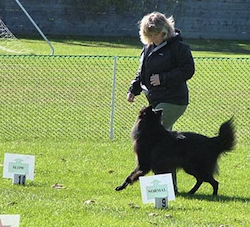 Ali and her dog Bing doing Rally. |
4. As a certified dog trainer and a certified dog behavior consultant who stays up to date in the latest techniques, What new methods are increasing in popularity to train dogs?
There are a few newer methods for working with dogs, particularly with issues like aggression and reactivity. I do not use them, partly because I have my own methods which are based on positive reinforcement and negative punishment, while these other methods use a lot of negative reinforcement, and partly because I believe so much in what I do that I don’t need to change it much.
I have been working with reactive dogs for about 12 years and I’ve seen some fantastic results. Once in a while I get a dog who seems to hit a wall, and then we explore other options, such as medications or more intensive TTouch.
Currently, though, I am practicing rewarding breathing skills with my Belgian who is anxious. Dr. Karen Overall has been doing this with many of her clients, and it is a form of biofeedback. It’s very interesting and I see a lot of potential in it.
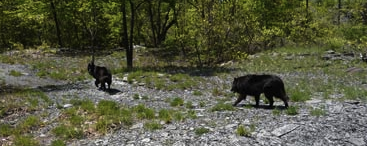
Ali likes to hike with her dogs. Above Bing and Acacia. She has taught them to "check in" with her before getting too far ahead. You can see Bing looking back towards Ali.
5. Dog Training Excellence promotes science in dog training. We always like to ask this question.
In the many gaps in knowledge about dog training and behavior that still exist, where in particular would you like to see more research done?
I think that I, at least, am lacking in real knowledge about fear periods in particular, and changing perceptions in general. In the work that I do, I so often see dogs who are ‘ok’ with this or that thing, and then suddenly, have issue with it. The dog reportedly has not had a bad association with the thing or being, and yet now the dog is fearful or reactive toward it. It sure would be helpful to know more about how this happens!
Products by Ali Brown
We want to thank Ali Brown again for taking the time out to speak with us at Dog Training Excellence. We hope she has given you some great ideas and helped you understand your canine friend a better.
To learn more about Ali Brown's seminars, classes visit Great Companions. You can also visit Scaredy Dog! to learn more about her popular book.
Home > Interviews with Pet Professionals > Interview with Ali Brown





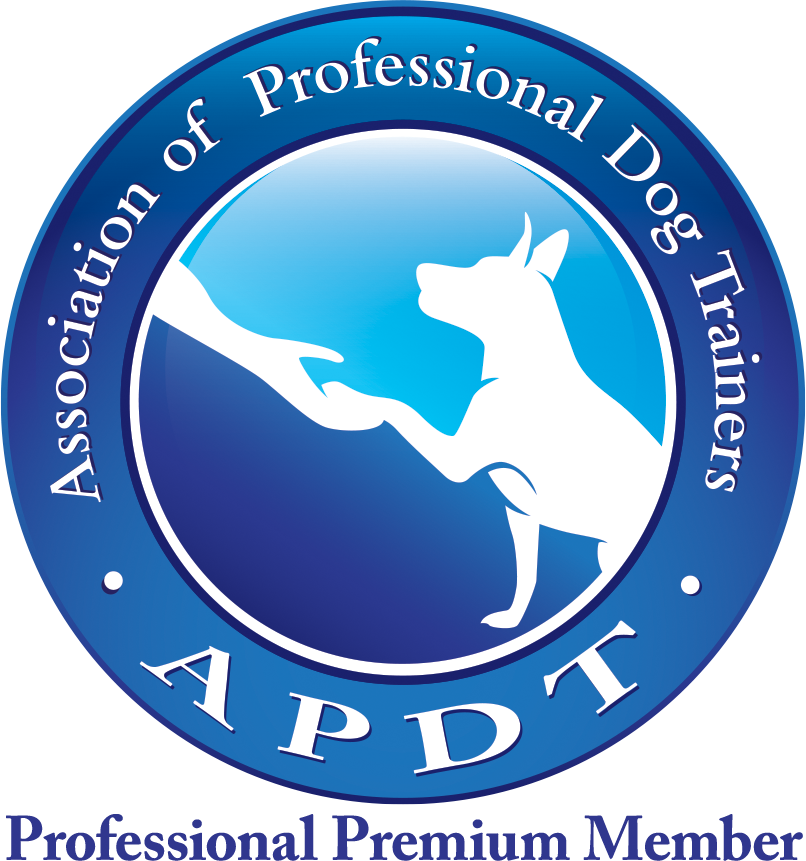


New! Comments
Questions? Anecdotes? Tips? Leave me a comment in the box below.